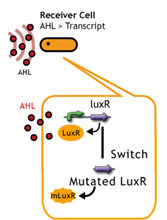Team:Chiba/Experiments:/LuxR mutant
From 2008.igem.org
(Difference between revisions)
(→LuxR mutant (Under Planning) |
(→Design) |
||
| Line 29: | Line 29: | ||
| - | + | Collins et.al. described the hyper-sensitive variants of luxR to AHL.(1) | |
| - | + | CollonsらとKockらによって、LuxRに変異を入れることでLuxRのAHLに対する感受性を変えることができると報告されている。<sup>(1),(2)</sup> | |
| - | + | ||
| - | + | ||
#Ile45PheとするとAHLに対する感受性が約10倍上昇する[[Team:Chiba/AHL Receiver Phase#References|<sup>(1)</sup>]] | #Ile45PheとするとAHLに対する感受性が約10倍上昇する[[Team:Chiba/AHL Receiver Phase#References|<sup>(1)</sup>]] | ||
#Leu42AlaとするとAHLに対する感受性が1/15に減少する[[Team:Chiba/AHL Receiver Phase#References|<sup>(2)</sup>]] | #Leu42AlaとするとAHLに対する感受性が1/15に減少する[[Team:Chiba/AHL Receiver Phase#References|<sup>(2)</sup>]] | ||
Revision as of 21:43, 29 October 2008
| Home | The Team | The Project | Parts Submitted to the Registry | Reference | Notebook | Acknowledgements |
|---|
LuxR mutant (Under Planning
Design
|
|
Collins et.al. described the hyper-sensitive variants of luxR to AHL.(1)
CollonsらとKockらによって、LuxRに変異を入れることでLuxRのAHLに対する感受性を変えることができると報告されている。(1),(2)
- Ile45PheとするとAHLに対する感受性が約10倍上昇する(1)
- Leu42AlaとするとAHLに対する感受性が1/15に減少する(2)
- Leu42SerとするとAHLに対する感受性が1/1000に減少する(2)
Experiment
|
|
| **[http://partsregistry.org/Part:BBa_S03623 BBa_S03623 (AHL autoinucer)] |
|
|
Method
- Transformed sender (Ptet-luxI), mutant LuxR Receiver (Ptet-mLuxR-Plux-GFP) and WT LuxR Receiver ()into E coli strains (BW⊿FliC)
- Inoculated Sender, WT Receiver (wild type luxR/BW⊿FliC) and mutated Receiver (1point mutation/BW⊿FliC) in liquid media for 12 h at 37℃.
- Inoculated again in liquid media upto about OD600=2 at 37℃
- Washed Senders and receiver.
- Mixed them. (Sender:Receiver=1000μL:1000μL)
- Incubated at 30°C.
- Measured intensity of green fluorescence at regular time intervals.
Reference
- Collins et.al. Directed evolution of Vibrio fischeri LuxR for increased sensitivity to a broad spectrum of acyl-homoserine lactones. Mol. Microbiol. 55, 712–723 (2005)
- B.Koch et.al.:The LuxR receptor: the sites of interaction with quorum-sensing signals and inhibitors. Microbiol. 2005 Nov;151(Pt 11):3589-602.
| Home | The Team | The Project | Parts Submitted to the Registry | Notebook |
|---|
 "
"





